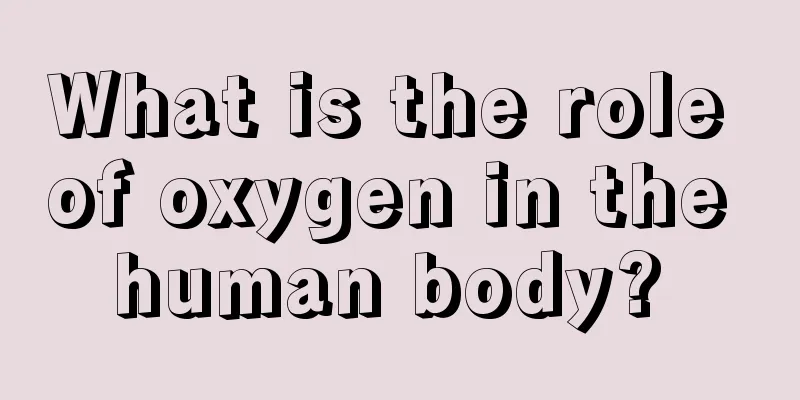What is the role of oxygen in the human body?

|
Everyone is breathing all the time. People usually breathe air. As we all know, the air contains many gases besides nitrogen and oxygen. After oxygen enters the human body, it will undergo a series of changes, and eventually the human body will expel carbon dioxide. In short, oxygen is an essential gas for the human body. Severe lack of oxygen will lead to death. So what role does oxygen play in the human body? The role of oxygen in the human body: Oxygen is important for your energy and health. Unless the body gets enough oxygen, symptoms such as fatigue, hyperventilation and fainting occur, and in extreme cases, death can occur. The role of oxygen Any change in oxygen levels affects the way your body breathes. Oxygen requirements vary from person to person and are completely dependent on the body's ability to adjust and compensate for low oxygen. Since oxygen is used as energy, it is an indispensable element for human survival. Cells in the body need oxygen to survive. Respiratory system The breathing process involves the inhalation and exhalation of air. Air enters the lungs as the chest muscles expand. The muscles then contract to force the air out. It's a simple but necessary process that keeps oxygen moving throughout the body. Air passes through the trachea into the lungs, where hemoglobin in red blood cells carries oxygen to the heart. Eventually, the carbon dioxide is returned to the lungs and exhaled out of the body. cycle Air passes through the bronchioles to tiny air sacs called alveoli. Here, small blood vessels carry blood through these alveoli and replace it with fresh oxygen. The capillaries carry this oxygen-rich blood from the lungs to the left ventricle of the heart, where it is pumped through the arteries to all parts of the body. The cells receive oxygen from the blood and remove waste products, such as carbon dioxide, which are then transported to the right ventricle via the veins. The blood here contains very little oxygen and is mostly waste. The blood is pumped back to the lungs, where it carries waste products through the capillaries into the alveoli. At this time, the carbon dioxide is expelled from the body through exhalation. Cellular Processes Cellular processes require oxygen to burn calories obtained from food. This process is used to convert food into energy, and is the opposite of photosynthesis, where plants convert energy into sugars. A cyclic sequence called the citric acid cycle (or Krebs cycle) drives this step within the cell. The process stores energy in cells called ATP, uses oxygen and produces carbon dioxide and water. Important elements Oxygen enables the body to convert food into energy. When deprived of oxygen, cellular respiration ceases and leads to cell death. The building blocks of proteins (amino acids) contain oxygen, so proteins also use oxygen as part of their molecular structure. The same is true for carbohydrates and fats. Since these molecules make up the majority of body tissue, oxygen is also one of the important elements that make up the human body itself. |
<<: How to take care of air bangs?
>>: Why can toothpaste treat athlete's foot?
Recommend
Will lung cancer treatment cause complications? The main things to note when treating lung cancer
Over the past half century, the incidence of bron...
Can I eat seaweed when I have thyroid nodules
Foods such as seaweed and kelp contain a lot of i...
What to do if ants get into your ears
There are actually many large and small insects l...
Symptoms of gonococcal urethritis
Gonococcal urethritis has an incubation period an...
What's wrong with the heat in the chest?
We usually feel discomfort in the chest. The so-c...
What are the conventional methods of liver cancer care? There are 8 conventional methods of liver cancer care
1. Follow the general nursing routine of TCM inte...
4 dietary recipes to remove bad breath from laryngeal cancer
Bad breath is a complication of laryngeal cancer....
What should you pay attention to in preventing lung cancer? What should you pay attention to in preventing lung cancer?
With the development of society and the improveme...
Treatment for severe cervical spondylosis
Cervical spondylosis is a relatively common disea...
What are the treatment principles for glioma
Glioma is a brain tumor disease that threatens hu...
What are the preventive measures for patients with pituitary tumors
Everyone knows that once some diseases are contra...
What diseases need to be differentiated from nasopharyngeal carcinoma?
In the diagnosis of nasopharyngeal carcinoma, it ...
Clinical manifestations of renal cancer
Common symptoms of kidney cancer are hematuria, m...
Ten thousand people are diagnosed with cancer in China every day. Doctors advise: If you want to live longer, please insist on three more and three less when you wake up in the morning
Aunt Li started her day as usual, facing the morn...
How long can a long-term alcoholic live
Drinking is a very common phenomenon nowadays. Mo...









